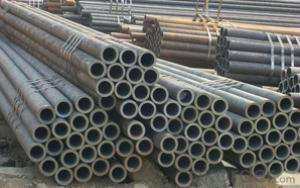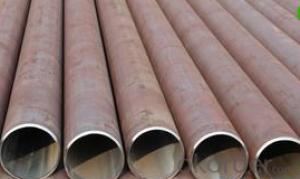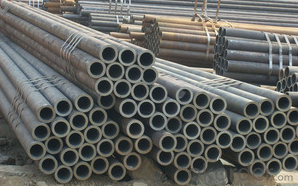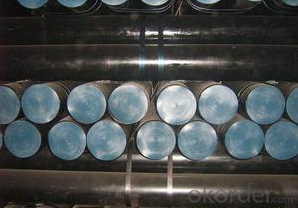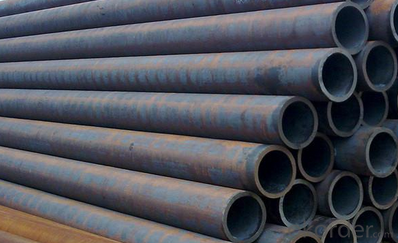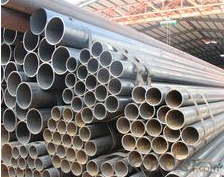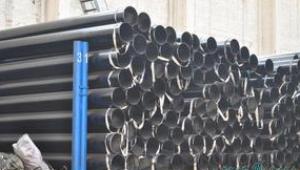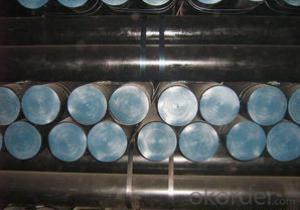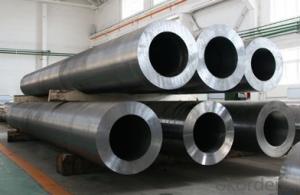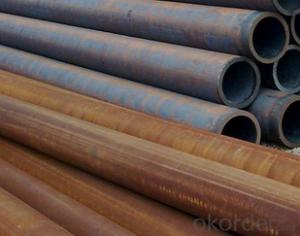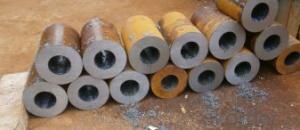Cold Drawn Carbon Steel Seamless Pipe A335P2 CNBM
- Loading Port:
- Qingdao
- Payment Terms:
- TT OR LC
- Min Order Qty:
- 10 pc
- Supply Capability:
- 30 pc/month
OKorder Service Pledge
OKorder Financial Service
You Might Also Like
Quick Details
| Thickness: | 1.2 - 20 mm | Section Shape: | Round | Outer Diameter: | 12.7 - 168 mm |
| Secondary Or Not: | Non-secondary | Application: | Boiler Pipe | ||
| Technique: | Cold Drawn | Certification: | PED | Surface Treatment: | oil coating |
| Special Pipe: | Thick Wall Pipe | Alloy Or Not: | Is Alloy | ASTM A213: | T2,T5,T9,T11,T12,T22,T23,T91,T91 |
| ASTM A335: | P1,P2,P5,P9,P11,P12,P22,P23,P91,P92 | DIN17175: | 15Mo3,10CrMo910,12CrMo195,13CrMo44 | Grade: | 12Cr1MoV,Cr5Mo,Cr9Mo,12Cr1MoVG,Cr5MoG,A335 P11,A335 P5,A335 P9,A335 P1,A213,A192,A210,A335 P12,A335 P23,St35.8,Cr-Mo alloy,A53-A369,ST35-ST52 |
| Standard: | BS 3059-2,DIN EN 10216-1-2004,DIN 17175,ASTM A213-2001,ANSI A210-1996,ASTM A179-1990,BS,DIN,ASTM |
Packaging & Delivery
| Packaging Detail: | Seaworthy export packing |
| Delivery Detail: | 45 Days |
Specifications
Standard:ASTM A179,DIN17175
Material:SA179,ST35.8
Size:12*1.2-168*20
Manufacture:cold drawn
Heat treating: normalized
Product Description
Commodity: cold drawn carbon steel seamless pipe
Standard&material: ASTM A213 T2,T5,T9,T11,T12,T22,T23,T91,T92, ASTM A335 P1,P2,P5,P9,P11,P12,P22,P23,P91,P92, DIN17175 15Mo3,10CrMo910,12CrMo195,13CrMo44, and equivalent standard and material.
Size range: 12mm*1.2mm - 168mm*20mm
Manufacture method: cold rolled, cold drawn
Delivery condition: Normalized, Normalized and Tempered.
Mill test certificate as per EN10204 3.1B is available.
Third party inspection is acceptable.
Tubes will be ECT+UT.
Packaging & Shipping
Packing: tubes will be packed in bundles tied with steel strips.
Oil coating,varnish,or black painting to be confirmed.
End plastic caps to be confirmed.
External packing by knit bags.
Marking: to be confirmed.
- Q: Can steel pipes be used for structural supports?
- Yes, steel pipes can be used for structural supports. Steel pipes are strong, durable, and have high load-bearing capacity, making them suitable for providing structural support in various applications such as buildings, bridges, and infrastructure projects.
- Q: How are steel pipes used in the defense sector?
- Steel pipes are used in the defense sector for various purposes such as constructing military infrastructure, manufacturing weapons, and creating protective barriers. They are often utilized in the construction of military bases, ammunition storage facilities, and communication systems. Steel pipes are also crucial for manufacturing armored vehicles, artillery, and missile systems. Additionally, they are employed in creating barriers and fortifications to enhance security and defense capabilities.
- Q: Are steel pipes resistant to ultraviolet (UV) radiation?
- No, steel pipes are not inherently resistant to ultraviolet (UV) radiation.
- Q: What are the different types of steel pipe joints?
- There are several different types of steel pipe joints, including threaded, welded, flanged, grooved, and compression joints.
- Q: How are steel pipes classified according to their use?
- Steel pipes are classified according to their use based on factors such as their diameter, wall thickness, and the intended application.
- Q: How are steel pipes used in plumbing systems?
- Steel pipes are commonly used in plumbing systems due to their durability and strength. They are typically used for water supply lines, sewage lines, and gas lines. Steel pipes are resistant to corrosion, making them a reliable choice for long-term use. They are often used in high-pressure systems and are known for their ability to withstand extreme temperatures. Additionally, steel pipes are easily accessible and cost-effective, making them a popular choice in plumbing installations.
- Q: Can steel pipes be used for underground power transmission?
- Indeed, underground power transmission can make use of steel pipes. Due to their resilience, robustness, and resistance to corrosion, steel pipes are extensively employed in underground power transmission systems. These pipes serve as a safeguarding enclosure for power cables, guaranteeing their security and shielding them from potential harm caused by external elements like moisture, soil movements, and potential impacts. Moreover, the use of steel pipes facilitates easy installation, maintenance, and repair of the power transmission system. Additionally, their ability to withstand high pressure and temperature renders them suitable for conveying the high voltage electricity essential for power transmission. All in all, steel pipes are a dependable and effective choice for underground power transmission.
- Q: How are steel pipes stored and transported?
- Steel pipes are typically stored and transported in a systematic and efficient manner to ensure their safety and prevent damage. When it comes to storage, steel pipes are usually stacked horizontally or vertically in designated areas. If stacked vertically, they are often placed on custom-made racks or stands that provide support and prevent them from rolling or collapsing. This vertical stacking method saves space and allows for easy accessibility when needed. To protect steel pipes from corrosion and environmental elements, they are often coated with a layer of paint or other protective materials. Additionally, pipes are sometimes stored indoors in warehouses or storage facilities to shield them from adverse weather conditions. When it comes to transportation, steel pipes are typically loaded onto trucks, railcars, or ships depending on the distance and destination. Specialized equipment such as cranes or forklifts is used to handle and load the pipes onto the transportation vehicles. Pipes are secured tightly to prevent movement during transit using straps, chains, or braces. This ensures that the pipes remain stable and do not cause any damage to themselves or other cargo. For long-distance transportation, steel pipes are often transported in bundles or stacks, secured with additional reinforcements. Pipes may also be packed in protective coverings or containers to shield them from external factors such as moisture, dust, or impacts. Overall, the storage and transportation of steel pipes involve careful planning, proper handling, and appropriate protective measures to ensure their integrity and quality are maintained throughout the process.
- Q: Can steel pipes be used for power plant construction?
- Yes, steel pipes can be used for power plant construction. Steel pipes are commonly used in power plants for various applications such as steam piping, water piping, and air/gas piping. They are preferred due to their strength, durability, and ability to withstand high temperatures and pressures. Steel pipes also have excellent corrosion resistance properties, which is crucial in power plant environments where different fluids and gases are transported. Additionally, steel pipes can be easily welded, allowing for efficient installation and maintenance. Overall, steel pipes are a reliable and cost-effective choice for power plant construction.
- Q: Can steel pipes be used for offshore oil and gas platforms?
- Yes, steel pipes can be used for offshore oil and gas platforms. Steel pipes are commonly used in offshore oil and gas platforms due to their durability, strength, and resistance to harsh marine environments. These pipes are typically made of high-grade steel alloys that can withstand the extreme pressures and temperatures associated with offshore drilling and production activities. Furthermore, steel pipes are versatile and can be easily welded, allowing for the construction of complex pipeline networks on offshore platforms. Additionally, steel pipes can be coated with protective coatings such as epoxy or anti-corrosion coatings to enhance their resistance to corrosion and extend their lifespan in the offshore environment. Overall, steel pipes are a reliable and widely used choice for transporting oil and gas on offshore platforms.
Send your message to us
Cold Drawn Carbon Steel Seamless Pipe A335P2 CNBM
- Loading Port:
- Qingdao
- Payment Terms:
- TT OR LC
- Min Order Qty:
- 10 pc
- Supply Capability:
- 30 pc/month
OKorder Service Pledge
OKorder Financial Service
Similar products
Hot products
Hot Searches
Related keywords
